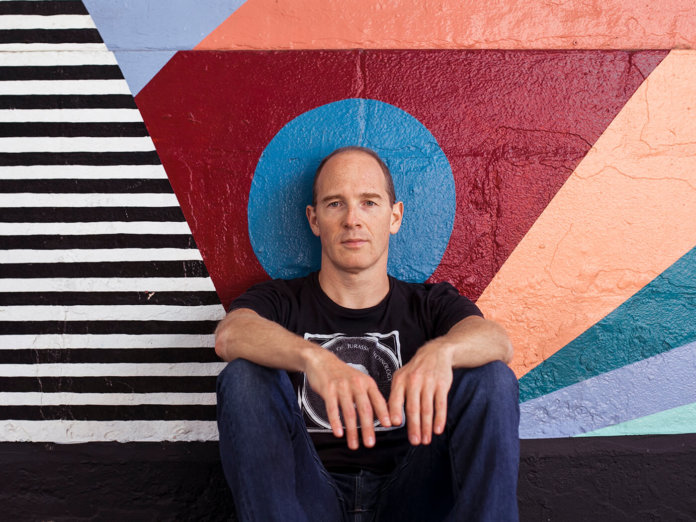“The thrill has never left me,” said Dan Snaith, when announcing his fifth album as Caribou, of his daily music-making habit. “I love it as much or more than I have always done.” Of course, plenty of artists declare their boundless enthusiasm for recording – and cynics might say it’s a slyly effective market motivator – but from debut The Milk Of Human Kindness, with its mix of pastel-bright electronica and motorik grooves, to the radiantly democratic synth pop of 2014’s Our Love, which reached No 8 on the UK chart, rapture has long been at the core of Caribou’s music.
Snaith’s is a contagious love that runs deeper than sound, however. The London-based Canadian producer has admitted to a longterm tendency to look inward in his work, but with Our Love he decided to embrace the generosity of self and deep, communicative warmth he admired in albums by Pharoah Sanders and Alice Coltrane. That record’s first single, the giddily glowing “Can’t Do Without You” introduced a more emotionally direct approach while slightly narrowing the distance between Caribou and Snaith’s clubbier incarnation, Daphni.
Now comes the more explicitly personal (but detail-free) Suddenly, with its themes of change, profound loss and life’s blunt-force unpredictability, its shapeshifting style so much a reflection of that title it’s almost onomatopoeic. And if anyone is still clinging stubbornly to their belief that electronic dance-pop lacks soul, these 12 luminous and inventive songs of a universally connective bent will surely haul them over the line.
Amassing a mountain of draft ideas out of which an album’s shape will emerge is Snaith’s usual MO and this time was no different, with more than 900 stems (mostly loops of just 30 seconds each) to be considered. Quite a challenge, although intuition sharpened across 20 years of releasing music, plus input from both his wife, and kindred spirit/sometime collaborator Kieran Hebden, saw it through. Snaith has always claimed that the process determines the end result, but this time it seems contrast appealed to him as much as congruence; and although long-serving ghosts like J Dilla and Arthur Russell are present, and a sample of ’70s soul singer Gloria Barnes’s “Home” is central to the languidly groovy single of the same name, nothing here is as straightforward as an influence or homage. On eight tracks, live (guest) electric guitar and/or saxophone augment Snaith’s usual modular synth/sampler/sequencer setup.
The album opens with “Sister” – a short’n’sweet, polyphonic symphony where synths gently burble as if in conversation, their flow interrupted by a brief, low-end belch toward the close – and finishes with “Cloud Song”, a thing of shivering beauty with a frame of warped beats and a Kraftwerkian core, festooned with strings of abstract psych pop and finished with a surprisingly showy, razored guitar riff. In between: the easy-swinging update on ’90s jazzy hip-hop that is “Lime”, with its unexpected swerve into a black spiritual and abrupt ending; the delirious “New Jade”, with a high-powered female vocal sample atop a pillow of plush synths and Snaith’s own forlorn voice the complement; and the winnowing “Magpie”, not too far removed from Kevin Parker’s dreamworld.
The build from rattly percussive canter to hands-in-the-air euphoria suggests that “Ravi” should be pronounced “ravey”, but it’s as close as Suddenly gets to the dancefloor. Apart from the dizzying “You And I”, that is: one of the first tracks Snaith started and one of the last to be finished, it’s too dynamically nuanced to qualify as a sad banger, but displays similar characteristics: an irresistibly molten melody, glitter-ball imperative, instant dopamine hit and (crucially) heartbreaking, solipsistic topspin. It’s the expression of a soul heavily winded by loss, but not fatally wounded: “You can take your place up in the sky/I will find a way to carry on down here/Just as long as you are near/We can only make it if we try,” sings Snaith, somehow uniting the disparately bittersweet likes of Nu Shooz, Bobby Womack and Pet Shop Boys while sounding beholden to no-one, because copyism is not his way.
Speaking to Uncut, he explains, “Throughout all the years I’ve made music, the only thing I’m looking for is a thrill or sense of excitement when I’m working on it or listening back to it,” adding that he finds the process “endlessly alluring, because it’s so elusive and hard to replicate”. Suddenly, then, appears as entirely Caribou-like – but with a wilder ecstatic magic in its heart.



